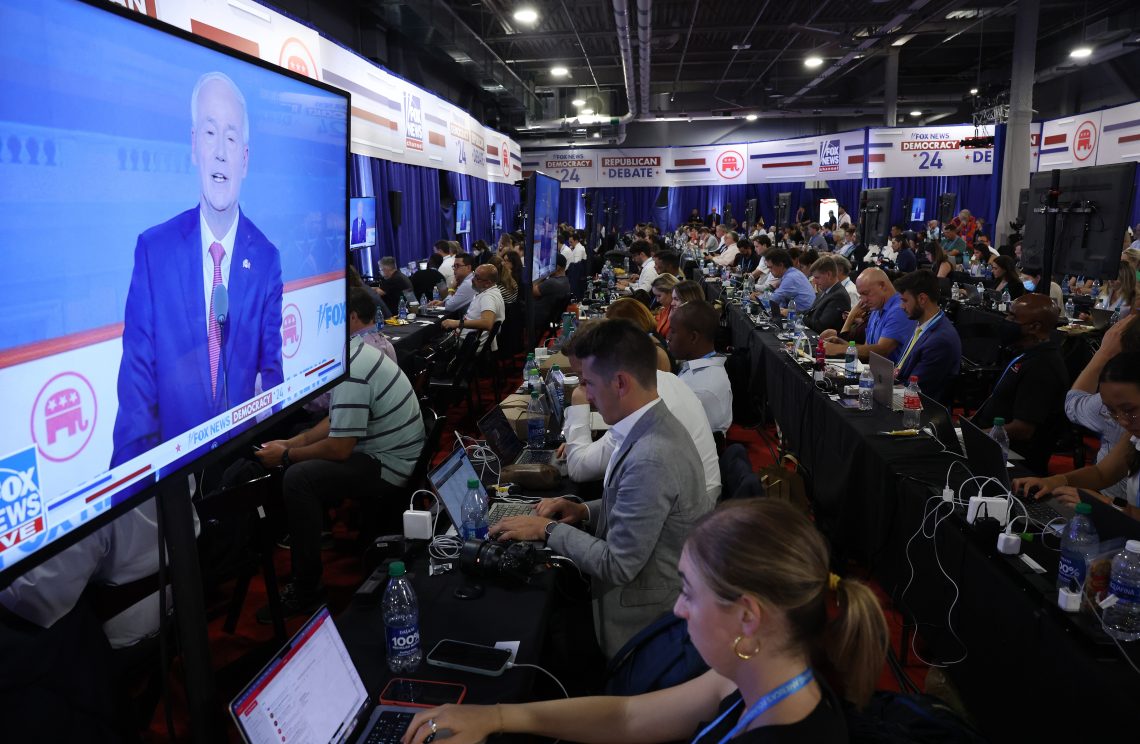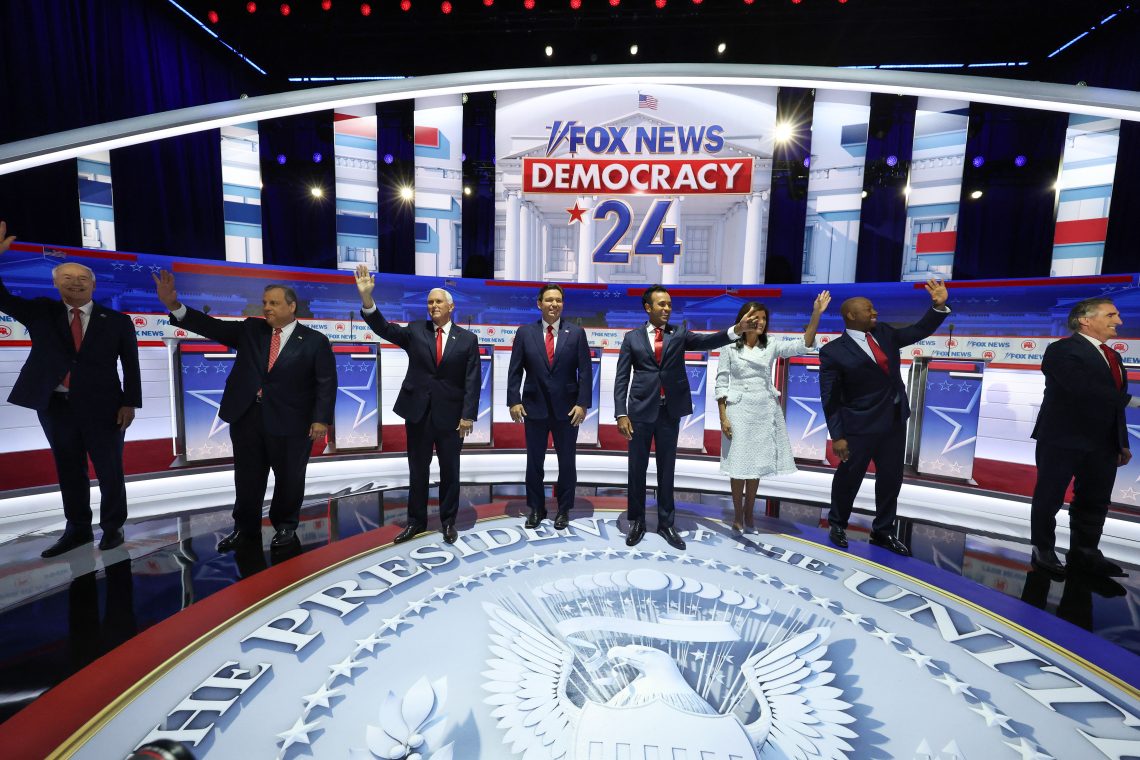National conservatism in the U.S. and the GOP’s future
A new faction of United States conservatives seeks to supplant the Republican Party’s free market principles with allegiance to national identity and the common good.

In a nutshell
- An ideological realignment is taking place among U.S. conservatives
- A cadre of young intellectuals criticize the Republican establishment
- They charge it has failed to defend American ideals from the Left
The field of candidates for the Republican Party’s (GOP) presidential nomination in the United States now totals 14 major contenders, and others may join the fray before the party’s convention a year from now. Current polls favor former President Donald Trump by a wide margin, but the outcome is far from certain. Among the many factors in play is the extent to which the budding national conservative movement disrupts the political status quo.
The GOP field covers a broad range of electoral experience, from the previous U.S. president to a talk-radio host. Their political sensibilities also span the conservative spectrum, including liberal, moderate, traditionalist, fundamentalist and populist wings of the Republican Party. (A running list of registered candidates is available here.) The final number of candidates may eclipse the 17 who entered the 2016 race – the largest GOP field in history.
The Republican National Committee held this cycle’s first primary debate in Milwaukee, Wisconsin, on August 23. The second is to take place on September 27 in Simi Valley, California. The debates are to be followed in 2024 by a series of primaries, caucuses and state conventions to select delegates. The presidential nominee will be chosen at the Republican National Convention in Milwaukee, scheduled for July 15-18.

Ideological renewal
The Republican base appears to be diversifying, although a simple majority of voters nationwide does not assure victory under the American electoral system. The proportion of Americans who identify as Republican has increased during the past four decades, and researchers have documented a decline in the Democrats’ voter advantage from 13.9 percentage points in 2008 to 4.1 percentage points in 2020. The most notable change is the virtual collapse of Democrat affiliation among non-college white voters (to the advantage of Republicans) and that the increase in Democrat affiliation among white college graduates has not balanced.

An ideological realignment is also occurring among conservatives, propelled mainly by a cadre of relatively young intellectuals who blame the Republican establishment for failing to, among other things, 1) arrest the Left’s debasement of Judeo-Christian values; 2) secure the porous borders; 3) curb the $32 trillion (and counting) gross national debt, and 4) curtail the corporate welfare and cronyism overrunning the nation’s capital.
Read more on U.S. party politics
U.S. congressional infighting is more than meets the eye
In journal pages and think tank corridors, the new wave of national conservatism challenges the pragmatic, decades-long “fusion” of the various factions on the Right. The debate transcends the policy differences over which Republicans have quarreled for decades. Instead, the national conservatives seek to supplant the long-held classical liberal principles of limited government, free market economics and civil liberties with allegiance to national identity and the common good.
In sum, according to scholar David Azerrad of Hillsdale College, “The young are looking for alternatives to establishment conservatism.”
National Conservatism’s roots
The fusion of conservative factions is largely credited to William F. Buckley, Jr., founder of the National Review magazine, and Frank Meyer, his associate editor, who united social traditionalists and economic libertarians into an anti-communist coalition. (Some scholars, however, attribute it to mutual opposition to the New Deal’s vast expansion of government power.) According to writer Stephanie Slade, the differences between the libertarians and the traditionalists did not seem so great “[i]n light of the threat posed by a rampaging Soviet Union – as militantly atheistic as it was militantly anti-capitalist.”
‘These conservatives, in particular, forgot everything they ever knew about how to conserve anything.’
Fusionism effectively peaked with the elections of President Ronald Reagan and British Prime Minister Margaret Thatcher. But, somewhat ironically, it all went to hell after the fall of the Soviet Union, as the nationalists see it.
Philosopher Yoram Hazony, chairman of the Edmund Burke Foundation, blames (so-called) free market fundamentalism for overshadowing fealty to Judeo-Christian values and the pursuit of national cohesion. As he noted in his 2019 address to the National Conservatism Conference, “These conservatives, in particular, forgot everything they ever knew about how to conserve anything. They lost interest in the Bible, in Christianity and Judaism. Neither nationalism nor religion had any hold on them any longer. All that interested them was economic liberalism and the rights of the free and equal individual.”
Republicans’ seemingly congenital moderation is simply no match against the radical progressives for whom the ends justify the means, the new nationalists contend. America’s future depends upon restoring American sovereignty and embracing state power to protect the common good.
That is a vastly different approach than the current doctrine.
Distrust of government direction
Many Americans are indeed profoundly uneasy about the country’s fate – manifesting in the populist wave that buoys Donald Trump. An NBC poll found that 79 percent of Republicans believe Democrats “pose a threat that, if not stopped, will destroy America as we know it.”
But as much as Republican voters embrace traditional values, their distrust of government intervention in both the culture and the economy – i.e., what national conservatism advocates – runs deep. Critics such as former Republican-turned-independent Congressmember Justin Amash even denounce national conservatism as “repackaged authoritarianism” that “has more in common with socialism than with libertarianism or classical liberalism.”
Whether because of his character flaws or ideological inconsistencies, former President Trump is not exactly hailed as a national conservative hero – although he shares their animus toward open borders, free trade and nation-building. Among the current presidential candidates, Florida Governor Ron DeSantis most closely articulates the nationalists’ moral code and enthusiasm for wielding government power.
And yet Governor DeSantis has been struggling lately, with polls registering steep declines in support in recent months. This is evident in the weakness of his small-dollar donations ($200 or less), a proxy for grassroots support. According to the latest campaign finance reports, just 17 percent of the total raised from individual contributions for Mr. DeSantis in 2023 has come from small-dollar donors compared to 82 percent for former President Trump.
The election outcome will gauge the degree to which national conservatism is or is not revolutionizing the American Right.
There may be a multitude of reasons for the DeSantis slump (which is not uncommon this early in the campaign season) that are unrelated to his nationalist leanings. Some GOP strategists say the Florida governor has yet to convey a national vision, and that his self-righteous tone is off-putting to more moderate voters. If true, that may bode ill for the moralizing nationalists, for whom crafting a message for Middle America will be a major challenge.

The new agenda’s impact
Until now, the national conservatives have largely steered clear of the campaign rough-and-tumble and confined their fight to the intellectual battlefield. But the prominence of Mr. Trump and Mr. DeSantis means that elements of their agenda will echo throughout the 2024 election.
A year out from the Republican National Convention is a political lifetime, during which the relative standings of candidates may change dramatically. Most Republican voters would be hard-pressed to expound on the relative strengths and weaknesses of national conservatism versus classical liberalism. However, they certainly are vocal about their alarm over the state of the nation. The election outcome will gauge the degree to which national conservatism is or is not revolutionizing the American Right.
Scenarios
In challenging the core principles of classical liberalism, the nationalist movement will increasingly divide conservative discourse among the intellectual elites. Once united under fusionism, the ideological factions will reemerge as nationalist fervor intensifies.
National conservatives will capitalize on the unease of Republican voters to steer the party platform toward greater government intervention in the areas of antitrust enforcement, industrial policy, protectionism and speech regulation.
Notwithstanding the ideological debate, most conservative voters will support the Republican nominee in 2024 rather than cede advantage to the Democrats.









